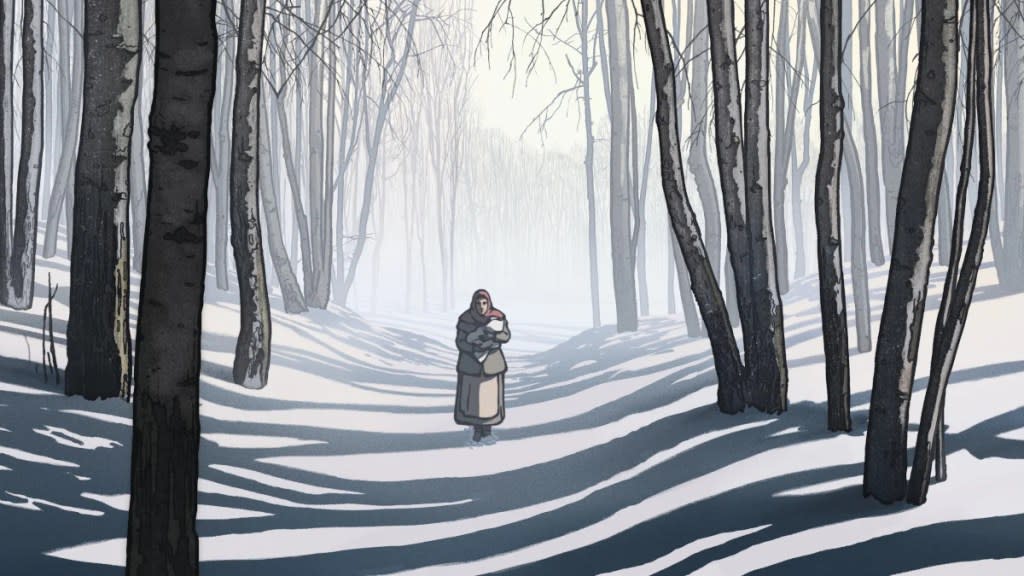‘The Most Precious of Cargoes’ Review: Michel Hazanavicius’ Animated Holocaust Drama Struggles With Restraint

How does one depict the unimaginable horrors of the Holocaust? In “The Most Precious of Cargoes” (titled “LA PLUS PRÉCIEUSE DES MARCHANDISES” in French), it’s initially from a significant remove where the terrifying roar of a train hurtling by says all we need to know.
However, the longer it all goes on, the more we are brought right into the camps themselves. The result is a film that feels like it’s pulling itself in different directions, going from leaning hard on narration to spell everything out in one moment to being delicately melancholic in another. Based on Jean-Claude Grumberg’s 2019 novel of the same name and with a screenplay by Grumberg and director Michel Hazanavicius (“Final Cut”), it’s often significantly different from the source material. Though mostly successful in the alterations that are made, there are some painfully sour notes as we get closer to the end that threaten to undercut the whole thing.
Premiering Friday in competition at the 2024 Cannes Film Festival, the film begins with the story of a woodcutter and his wife who live alone in the forest. While they are getting by, theirs is still a harsh life. It’s then both a blessing and a curse that they don’t have children. On the one hand, they don’t have another mouth to feed. On the other, the woodcutter’s wife deeply wants one.
She then finds one that has been thrown free from the passing train that is carrying countless Jewish people off to be killed. The act was done out of desperation by a father — anywhere was better than the horrors that they were moving towards. The woodcutter’s wife then devotes her every waking hour to raising the child while her husband is hateful towards the newborn and dismissive of the whole idea. With an often effective though occasionally tonally off-kilter score by Alexandre Desplat, the film attempts to navigate what can be quite shaky narrative ground.
What keeps it steady is a simple yet often stunning animation style that grows on you. Almost looking more like it was originally a children’s storybook that has leaped off the pages and come to life, it plays like a fairytale where the wheels of mass death turn on the margins of the frame. At least, that’s where they are to start, as we soon see them come right into the center to mixed results. There is a tendency to praise the decision to look vast historical horror dead in the eyes as “unflinching,” but there is something to be said for exercising care with how you go about doing so. Just last year at the festival, Jonathan Glazer’s monumental “The Zone of Interest” grappled with how to go about doing this and made something as thoughtful as it was terrifying.
To compare “The Most Precious of Cargoes” to that Oscar-winning film might be a bit unfair, as this is clearly meant to be a more accessible work of animation. At the same time, all cinema attempting to depict the Holocaust must engage with these questions and each now lives in the shadow of films like Glazer’s. There is much to “The Most Precious of Cargoes” that seems aware of this in its early stretches. Even when we are eventually taken inside one of the train cars to see the grief in the father’s eyes as he throws his child out in an attempt to save her, it never crosses the line into feeling exploitative. But other moments near the end of the film, including one of a character looking at their reflection in a window, lack this tact and instead feel leering.
There is redemption that the film finds in its ending. Rather than spelling things out, the final lines complicate what we have seen and why we’re drawn to these types of stories. Despite the rocky journey to get there, the film manages to pull itself back from the brink just as it somberly pulls into one more station.
The post ‘The Most Precious of Cargoes’ Review: Michel Hazanavicius’ Animated Holocaust Drama Struggles With Restraint appeared first on TheWrap.

 Yahoo News
Yahoo News 
